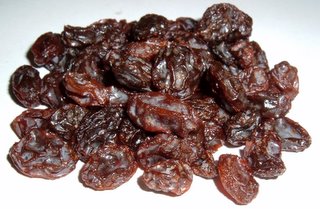can't have enough of ...(pt.1)
 RAISINS! Ever since I ate them couple years ago, it's been my companion during my school days (it's one of my fave besides blueberry bagel+strawberry cream cheese, blueberry muffin, and trail mix energy bar). Recently, I just bought a pack of raisins and brought it to work. It's really good...and I just can't get enough of them :) So what are raisins? Raisins are dried grapes and can be eaten raw or used in cooking and baking. Raisins are very sweet due to the high concentration of their sugars, and if they are stored for a long period the sugar crystallises inside the fruit. This makes the fruit gritty, but does not affect the usability. In the United States, the term 'raisin' refers to any form of dried grape. California raisins – both the sun-dried dark naturals and the goldens – are made by drying Thompson Seedless grapes; dark naturals are sun dried, while goldens are treated with sulphur then flame dried. Another variety of seedless grape, the Black Corinth, is also sun dried to produce Zante currants, mini raisins that are much darker in colour and have a tart, tangy flavour. Derived from the same word used in the French language. In French, raisin means "grape"; a raisin is called a raisin sec, which means "dry grape".
RAISINS! Ever since I ate them couple years ago, it's been my companion during my school days (it's one of my fave besides blueberry bagel+strawberry cream cheese, blueberry muffin, and trail mix energy bar). Recently, I just bought a pack of raisins and brought it to work. It's really good...and I just can't get enough of them :) So what are raisins? Raisins are dried grapes and can be eaten raw or used in cooking and baking. Raisins are very sweet due to the high concentration of their sugars, and if they are stored for a long period the sugar crystallises inside the fruit. This makes the fruit gritty, but does not affect the usability. In the United States, the term 'raisin' refers to any form of dried grape. California raisins – both the sun-dried dark naturals and the goldens – are made by drying Thompson Seedless grapes; dark naturals are sun dried, while goldens are treated with sulphur then flame dried. Another variety of seedless grape, the Black Corinth, is also sun dried to produce Zante currants, mini raisins that are much darker in colour and have a tart, tangy flavour. Derived from the same word used in the French language. In French, raisin means "grape"; a raisin is called a raisin sec, which means "dry grape".
In a 1/4 cup serving of California raisins (40 grams), there is usually quite a bit of sugar (28-32 grams), contributing to around 110-140 calories. Also, a serving of raisins usually has 2 grams of fiber, as well as a very small amounts of protein (often 1 gram), sodium (usually around 10 milligrams), calcium, and iron. Raisins are high in potassium, with 310 milligrams (about 9% of the daily value).
Dentists and Dental hygienists have long recommended not eating raisins as it was believed that the combination of sugars and stickiness in them would promote tooth decay and gum disease. However, research indicates that the stickiness of a food is not an indicator of its effects on oral health. Additionally, raisins have been found to contain several chemical compounds that may assist in fighting oral bacteria. In a laboratory, extracts from raisins were found to slow the growth of Streptococcus mutans, the main bacteria behind tooth decay. Five chemicals in raisins — oleanolic acid, oleanolic aldehyde, betulin, betulinic acid, and 5-(hydroxymethyl)-2-furfural — seem to be responsible for slowing the bacteria. In addition, oleanic acid prevents S. mutans from sticking to tooth enamel. (http://en.wikipedia.org/wiki/Raisin) So......after all the information, it turns out that eating raisins is good for you :) maybe as long you don't overdo it. Everything that's too much isn't good for your body, right?
ok...so far that's it for now. I'm going to continue part 2 another time another post. I know what I want to talk about but it's too bloody long. Have to think a way to sum everything up hehehehehe :)
1 comment:
it's never too long, you know. this is your blog. you can write anything you want :p
so just write away ^.~ hehehe...
now I feel like having a snack. hmm...just something to chew on. but I'm still full from lunch really.
raisins is all right. the cereal I'm eating lately has raisins and it makes it sweet. but don't think I like to snack on just raisins that much ;) it's a matter of preference. what would be my favorite snack? let's see. aahh, the chips from back home. miss them!
Post a Comment